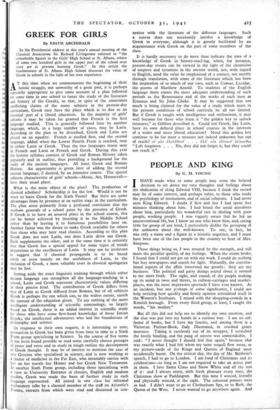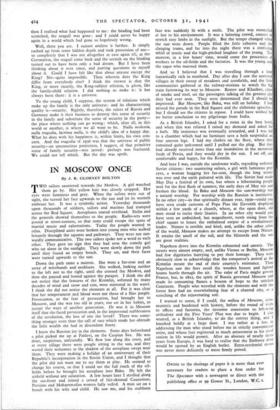PEOPLE AND KING
By G. M. YOUNG IHAVE made what to some people may seem the belated decision to set down my own thoughts and feelings about the abdication of King Edward VIII, because I think the record may be of some interest, and perhaps value, to those who study the psychology of institutions, and of social relations. I had never seen King Edward. I doubt if first and last I had spent five minutes thinking about him. I had heard the usual anecdotes about him, particularly his wonderful tact in dealing with poor people, working people. I was vaguely aware that he led an unconventional life, but I knew no one who knew him, and, caring little for gossip of any kind, I particularly dislike the gossiping of the unknown about the well-known. To me, in fact, he was only a name and a figure in a historic sequence, and I must have been one of the last people in the country to hear of Mrs. Simpson.
These things being so, I was amazed by the strength, and still more the peculiar quality, of my feelings. When the storm broke, I found that I could not get on with my work. I could do nothing but buy newspapers and search for light. Naturally, the constitu- tional aspects of the affair interested me greatly : they are my business. The political and party doings round about it seemed to me mere froth. The sight, and sound, of the people making up its mind in twos and threes, in railway-carriages and market- places, was the most impressive spectacle I have ever known. As an incident, but one perhaps of some significance, I could not help noticing how quickly and firmly opinion articulated itself in the Women's Institutes. I mixed with the shopping-crowds in a Kentish borough. From every third group, at least, I caught the words, " his mother."
But all this did not help me to identify my own emotion, and the clue was put into my hands in a curious way. I am no col- lector of books, but I have my fancies, and among them is a Victorian Parlour-Book, Italy Illustrated, in crushed green morocco. Taking it carelessly out of its wrapper, I scratched the lovely binding, and the pang of sorrow was unmistakable. I said: " I never thought I should feel that again," because that was exactly what I had felt when my tame seagull flew away, or my picture-cards of the Kings and Queens of England were accidentally burnt. On the critical day, the day of Mr. Baldwin's speech, I had to go to London. I am fond of Christmas and its celebrations—so long as I am not required to take an active part in them. I love Santa Claus and Snow White and all the rest of it : and I always enjoy, with fresh pleasure every time, the Christmas show at Paddington. But this time I winced, literally and physically winced, at the sight. The coloured posters were as bad. I didn't want to go to Cheltenham Spa, or to Bath, the Queen of the West. I never wanted to go anywhere again. And
then I realised what had happened to me : the binding had been scratched, the seagull was gone : and I could never be happy again in a world which had gone so hopelessly wrong.
Well, there you are. I cannot analyse it further. It simply rushed up from some hidden depth and took possession of me— so completely that I was not altogether at case again tilt, at the Coronation, the seagull came back and the scratch on the binding turned out to have been only a bad dream. But I have been thinking about it ever since, and putting questions to myself about it. Could I have felt like that about anyone except the King? No—quite impossible. Then wherein does the King differ from everybody else? I think the answer is that the King, or more exactly, the King-subject relation, is given, like the family-child relation. I did nothing to make it : it has always been there : it is a universe.
To the young child, I suppose, the system of relations which make up the family is the only universe: and its characterising quality is—security. Rightly, therefore, the rulers of Russia and Germany make it their business to destroy this sense of security in the family and substitute the sense of security in the party— the place where nothing can go wrong : which, after all, in this world or another, is where we all want to be. Nulla molestia, nulla tragedia, lacrima nulla, is the child's idea of a happy day. What he does with his happiness is, within limits, his own con- cern. And the tragedia of 1936 was that the universe of public security—an unconscious projection, I suggest, of that primitive sense of family security—was jarred: perhaps was fractured. We could not tell which. But the day was spoilt.























 Previous page
Previous page